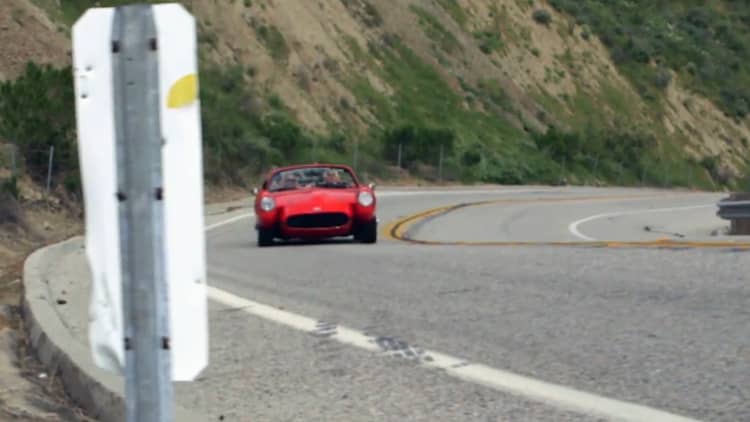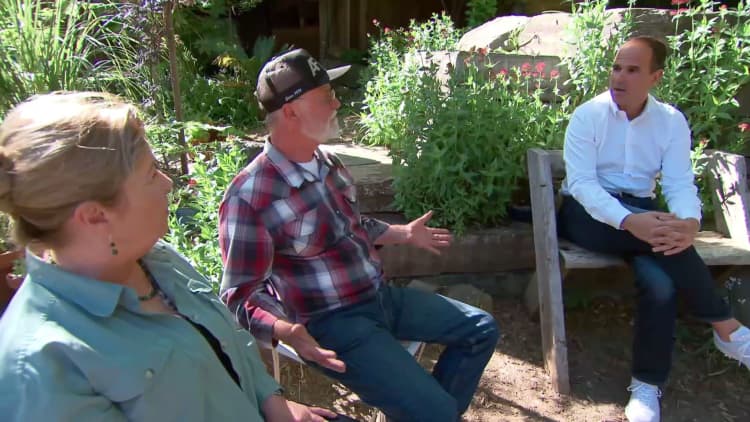Tom and Karen Hessler left New York in 1971 for Humboldt County, a beautiful region in northwestern California that is today home to thousands of marijuana farms. Back then, it was deforested and severely depressed. They bought their 40 acres for a resounding $9,000, or just over $55,000 today.
The Hesslers live in a house that they built, eat food that they grow and use electricity that they produce. That was always their dream: To live self-sufficiently, plus settle down somewhere Tom could focus on his artwork.
"If I had to describe your land to somebody, I couldn't," Marcus Lemonis tells the couple, now in their 70s, who he visits on Tuesday's episode of CNBC's ." "It's like in a fairytale book. It's so beautiful and so removed."
Pot-farming wasn't originally part of the Hesslers' plan. "We are the people who started this industry. There was nobody growing weed. There was nobody here, Marcus. Every piece of land was for sale," Tom says.
"You could've bought the whole mountain for 100 bucks," Lemonis jests, and Tom replies that you actually could have for just $36,000.
"Today it'd be $36 million," the host then speculates.
As some of the earliest growers in the region, the Hesslers helped establish Humboldt as what Lemonis calls the "pot capital of the U.S." More farms gradually sprung up in the region through the '70s. By the '80s, Humboldt's economy was "riding high, as Lemonis puts it, as the region supplied cities throughout the U.S.
It is not an easy business to be in, though. Farmers have faced the constant threat of crackdown from law enforcement, which persisted even after medical marijuana was legalized in Calif. with Proposition 215 in 1996.
The Hesslers' children, Nya and Elan, recall constantly wondering whether their parents were going to be arrested as they grew up.
"Certain kids in school you avoided because, like, their dad was a sheriff," says Nya, who recounts an incident where he was chased for 45 minutes by a helicopter through the woods by their property. "I just finally just stopped and sat there and waited, and then they finally just flew off."
Lemonis interviews another Humboldt County grower who wasn't so lucky. In his twenties, with no prior criminal record, Johnny Casali was caught growing 1500 marijuana plants. "I woke up at 6 o'clock in the morning. Thirty federal agents showed up at my door, guns to my head," he says. He served nearly eight years in prison.
As of the New Year, recreational marijuana use is permitted in California, which now has the biggest legal marijuana market in the world. However, that doesn't mean growers are totally protected.
As Lemonis notes, the threat of federal enforcement remains. And many farmers struggle financially with a supply glut driving prices down and taxes cutting into their profits — steep enough that some continue to sell on the black market to avoid them.
The Hesslers, who have gone legal, just had one of their best growing seasons ever. "The weather's just been perfect. Absolutely perfect," says Tom. But it's too soon to tell if their crop will turn a profit.
Plus, they're contending with competition brought by newcomers with no ties to Humboldt County looking to break into the industry.
"We've been doing this for 50 years," he says. "And for almost 50 years people have been chasing us, chastising us, and trying to destroy us. Now they all want to be in with us."
Like this story? Like CNBC Make It on Facebook.
Don't miss: Jay Leno drives a car made out of cannabis
CNBC's "" airs Tuesdays at 10 p.m. ET.

A previous version of this article contained inaccuracies regarding the value of the Hessler's property and their business.






